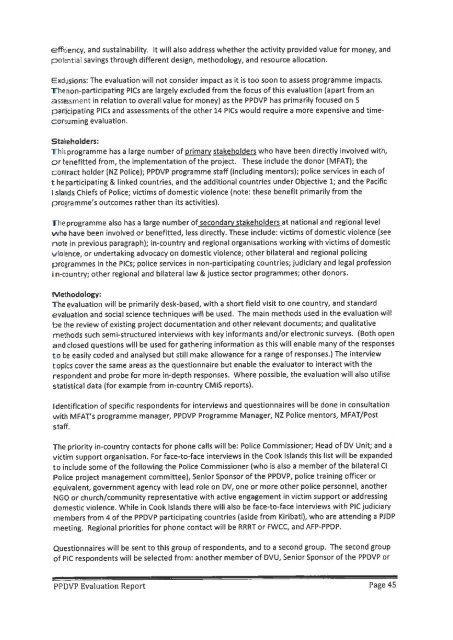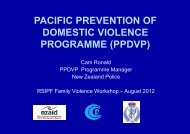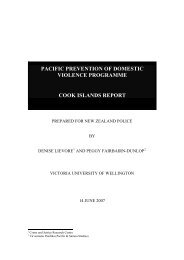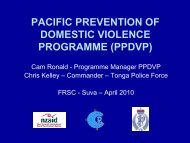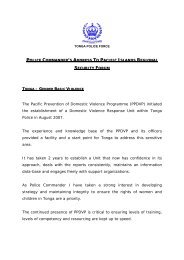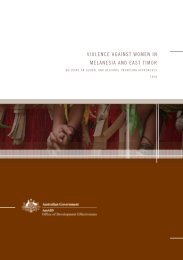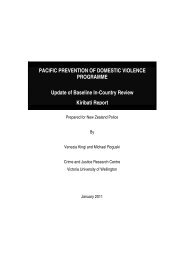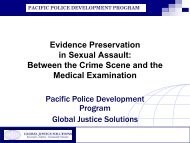PPDVP Evaluation Report - Pacific Prevention of Domestic Violence ...
PPDVP Evaluation Report - Pacific Prevention of Domestic Violence ...
PPDVP Evaluation Report - Pacific Prevention of Domestic Violence ...
You also want an ePaper? Increase the reach of your titles
YUMPU automatically turns print PDFs into web optimized ePapers that Google loves.
efficiency, and sustainability. It will also address whether the activity provided value for money, andpotential savings through different design, methodology, and resource allocation.Exclusions: The evaluation will not consider impact as it is too soon to assess programme impacts.The non-participating PlCs are largely excluded from the focus <strong>of</strong> this evaluation (apart from anassessment in relation to overall value for money) as the <strong>PPDVP</strong> has primarily focused on 5participating PlCs and assessments <strong>of</strong> the other 14 PlCs would require a more expensive and timeconsumingevaluation.Stakeholders:This programme has a large number <strong>of</strong> primary stakeholders who have been directly involved with,or benefitted from, the implementation <strong>of</strong> the project. These include the donor (MFAT); thecontract holder (NZ Police); <strong>PPDVP</strong> programme staff (including mentors); police services in each <strong>of</strong>the participating & linked countries, and the additional countries under Objective 1; and the <strong>Pacific</strong>Islands Chiefs <strong>of</strong> Police; victims <strong>of</strong> domestic violence (note: these benefit primarily from theprogramme's outcomes rather than its activities).The programme also has a large number <strong>of</strong> secondaw stakeholders at national and regional levelwho have been involved or benefitted, less directly. These include: victims <strong>of</strong> domestic violence (seenote in previous paragraph); in-country and regional organisations working with victims <strong>of</strong> domesticviolence, or undertaking advocacy on domestic violence; other bilateral and regional policingprogrammes in the PICs; police services in non-participating countries; judiciary and legal pr<strong>of</strong>essioni n-country; other regional and bilateral law &justice sector programmes; other donors.Methodology:The evaluation will be primarily desk-based, with a short field visit to one country, and standardevaluation and social science techniques will be used. The main methods used in the evaluation willbe the review <strong>of</strong> existing project documentation and other relevant documents; and qualitativemethods such semi-structured interviews with key informants and/or electronic surveys. (Both openand closed questions will be used for gathering information as this will enable many <strong>of</strong> the responsesto be easily coded and analysed but still make allowance for a range <strong>of</strong> responses.) The interviewtopics cover the same areas as the questionnaire but enable the evaluator to interact with therespondent and probe for more in-depth responses. Where possible, the evaluation will also utilisestatistical data (for example from in-country CMlS reports).ldentiflcation <strong>of</strong> specific respondents for interviews and questionnaires will be done in consultationwith MFAT's programme manager, <strong>PPDVP</strong> Programme Manager, NZ Police mentors, MFATIPoststaff.The priority in-country contacts for phone calls will be: Police Commissioner; Head <strong>of</strong> DV Unit; and avictim support organisation, For face-to-face interviews in the Cook Islands this list will be expandedto include some <strong>of</strong> the following the Police Commissioner (who is also a member <strong>of</strong> the bilatera! CIPolice project management committee), Senior Sponsor <strong>of</strong> the <strong>PPDVP</strong>, police training <strong>of</strong>ficer orequivalent, government agency with lead role on DV, one or more other police personnel, anotherNGO or church/community representative with active engagement in victim support or addressingdomestic violence. While in Cook Islands there will also be face-to-face interviews with PIC judiciarymembers from 4 <strong>of</strong> the <strong>PPDVP</strong> participating countries (aside from Kiribati), who are attending a PJDPmeeting. Regional priorities for phone contact will be RRRT or FWCC, and AFP-PPDP.Questionnaires will be sent to this group <strong>of</strong> respondents, and to a second group. The second group<strong>of</strong> PIC respondents will be selected from: another member <strong>of</strong> DVU, Senior Sponsor <strong>of</strong> the <strong>PPDVP</strong> or<strong>PPDVP</strong> <strong>Evaluation</strong> <strong>Report</strong> Page 45


